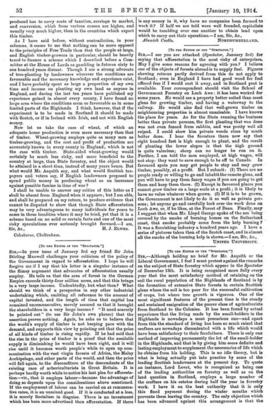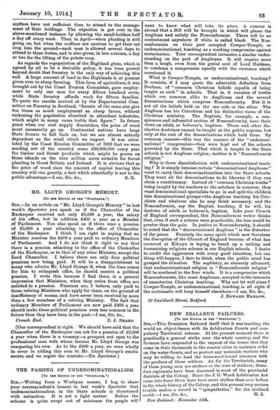[To Tao EDISON or Tag "SPacreros..] Srs,—Although holding no brief
for Mr. Asquith or the Liberal Government, I feel I must protest against the remarks- on the subject of State forestry which appear in the Spectator of December 13th. It is being recognized more fully every year that the moat satisfactory method of retaining on the soil the rural population of the Highlands of Scotland is by the formation of extensive State forests in certain Scottish glens where the soil is too poor for the successful cultivation of crops, but where tree growth is vigorous. One of the most significant features of the present time is the steady and sustained emigration of the poorer class of agriculturists from Scotland to the Colonies. It has been found by actual experience that the living made by the small-holders in the Highlands is nowadays a most precarious one—and apart from this the standard of living has been so much raised that crofters are nowadays discontented with a life which would. have been satisfactory to their forefathers. There is only one method of improving permanently the lot of the small-holder in the Highlands, and that is by giving him some definite and lasting employment to supplement the necessaries of life which he obtains from his holding. This is no idle theory, but is what is being actually put into practice by some of the leading Scottish landowners at the present day. To quote an instance, Lord Lovat, who is recognized as being one of the leading authorities on forestry as well as on the land question in Scotland, employs a large number of the crofters on his estates during half the year in forestry work. I have it on the beet authority that it is only this fixed payment during the winter months which prevents them leaving the country. The only objection which has been advanced against this arrangement is that the
crofters have not sufficient time to attend to the manage- ment of their holdings. The objection is got over in the above-mentioned instance by allowing the small-holders half a day off every week. Then in April—when planting is still going on, but when the crofters are anxious to get their oat crop into the ground—each man is allowed several days to attend to these duties, and is also given, in late autumn, a day Or two for the lifting of the potato crop.
As regards the repopulation of the Highland glens, which is agreed by all to be a desirable policy, it has been proved beyond doubt that forestry is the only way of achieving this end. A large amount of land in the Highlands is at present given over to sheep farming. This form of agriculture, it was brought out by the Coast Erosion Committee, gave employ- ment to only one man for every fifteen hundred acres, while State forestry affords work for fifteen families. To quote the results arrived at by the Departmental Com- mittee on Forestry in Scotland, "forests of the same size give ten times as mush employment as sheep farms, without reckoning the population absorbed in attendant industries, which might in many cases treble that figure." In future years when our coal supply diminishes, the price of wood must necessarily go up. Continental nations have large State forests to fall back on, but we are almost entirely dependent on the wood which we import. It was calcu- lated by the Coast Erosion Committee of 1909 that we were sending out of the country some £30,000,000 every year for timber and forest products which might be grown on these islands on the nine million acres suitable for forest planting in Great Britain and Ireland. It is obvious that as the price of wood rises the amount of capital leaving this country will rise greatly, a fact which admittedly is not to the
public advantage—I am, Sir, Ac., S. G.







































 Previous page
Previous page